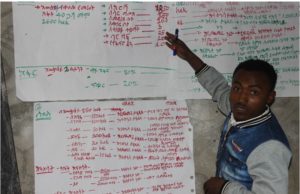Community level pilot study
In the local-level Ethiopia pilot at Telecho (see this report), the use of RAPTA was more comprehensive and took place over three workshops over a 9 month period. This process led to a shared understanding of possible alternative futures, and identified some critical thresholds in soil acidity, nutrient cycling, capital and market linkages that warrant monitoring because they will influence the future state of the system. Applying RAPTA also revealed unresolved questions and contested issues, and enabled them to be articulated more clearly and discussed in a structured and safe manner.
Three distinct but complementary pathways to transition to a more food secure system were apparent from the community level workshops in Telecho:
- Improving the productivity and resilience of rain-fed agriculture with interventions to reduce significant losses in the integrated soils-crop and livestock system, and establishing cooperatives and networks to markets.
- Expanding small-scale irrigation and specialisation in horticulture, bee-keeping, poultry, dairy, feedlots and linking in to market and value chains through strong cooperatives.
- Negotiating decent jobs and career paths for landless and youth in emerging industries in surrounding urban centres.
We are currently working with local non-governmental organisations to explore potential donors for a project proposal built on the systems understanding and on options and pathways articulated in the RAPTA workshops.
